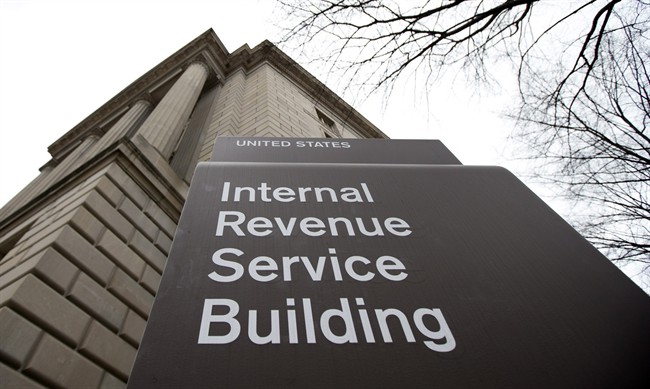Two Canadians with dual United States citizenship are suing the federal government over a deal that lets Canadian banks give their clients’ personal information to the Internal Revenue Service if they think the client is an American citizen.

Both Ontario women were born in the United States but have lived in Canada since age five, never worked in the U.S. and never filed U.S. tax returns.
Their statement of claim, filed in federal court in Vancouver Monday, argues the Foreign Account Tax Compliance Act (FATCA) tax deal that Ottawa signed with the United States in February violates the Charter of Rights.
Under the intergovernmental agreement, banks must give the IRS the names and account details of any clients with “U.S. indicia,” such as a U.S. birthplace, unless the client certifies that they’re not a U.S. citizen, prove they’re a citizen of another country and produce a U.S. Certificate of Loss of Nationality, or a “reasonable explanation” of why they don’t have one.
The deal was announced in February and passed into law in June as part of the budget bill. It’s designed to bring U.S. citizens abroad under IRS scrutiny (the U.S. is one of the few countries in the world that requires expats to file taxes even if they don’t owe any and have already filed in their country of residence).
Retired Osgoode Hall law professor and Charter expert Peter Hogg wrote in 2012 that an agreement would be “discriminatory in a way that would not withstand Charter scrutiny.”
But a story in Tax Notes International, published in June of 2013, interviewed lawyers who disagreed with Hogg’s argument.
This lawsuit seeks to overturn that deal, arguing that it violates section 15 of the Charter, which prohibits discrimination, and sections 7 and 8, which protect “life, liberty and security of the person” and forbid “unreasonable search or seizure”.

Get weekly money news
READ: Why are so many American expats giving up citizenship? It’s a taxing issue
The plaintiffs are listed as Virginia Hillis, 68, a retired lawyer in Windsor, Ont. and Gwen Deegan, a 52-year-old graphic designer in Toronto.
Hillis, both of whose parents were Canadian, was born in Michigan and has been living in Canada since the age of five. Deegan, born in Washington State, has also been living in Canada since she was five, the statement of claim says. Neither has ever worked in the U.S. or filed U.S. tax returns.
Both women have been told at the U.S. border that they are American citizens and should enter the U.S. with a U.S. passport. Because of their birthplaces, both have “U.S. indicia” which will lead to their financial data being passed to the IRS.
How many Canadians are in that position? Depends whom you ask.
The U.S. State Department estimates that about a million Americans live here, while the 2006 census found about 300,000 people in Canada self-identifying as U.S. citizens. (The difference may be accounted for by Canadians who were born in the United States, or who have an American parent, but don’t consider themselves American.)
READ: How to get rid of your U.S. citizenship
Ottawa’s agreement solved a problem for Canadian financial institutions, which were caught between facing a punitive 30 per cent tax on their U.S. investments if they didn’t disclose client information, and potential breaches of Canadian privacy law if they dealt directly with the IRS.
So if the agreement’s struck down in court that could cause banks grief, says McGill University tax law professor Allison Christians.
“That’s why the U.S. sanction regime is so particularly effective in Canada – that’s why there was such a rush to get the IGA in, and get it in that omnibus bill, and get it passed without any scrutiny – you see these two systems so intertwined. It’s hard to imagine Canadians working without touching the U.S. market,” she said.
Without the agreement, “you’re back where you were before the intergovernmental agreement, which is that the United States has a law which punishes financial institutions for not doing something which they cannot do under Canadian law.”
In addition to claiming the tax agreement violates the Charter, the suit also argues Parliament went beyond its jurisdiction in imposing the FATCA reporting structure on credit unions, which are provincially regulated.
The challenge is funded by the Alliance for the Defence of Canadian Sovereignty, a Toronto-based group raising funds for the case online.
“It shows the problem for what it is: the law doesn’t work,” Christians says. “FATCA is not the problem. The problem is citizenship-based taxation that requires discrimination against people who are U.S. persons.”
Update, 10:30 a.m. ET Aug. 13: “The Government is confident that the legislation in question is constitutionally valid,” finance department spokesperson Jack Aubry said in an e-mail late Tuesday. “The Government is prepared to defend the legislation in court. As the matter is under litigation, we are not in a position to comment further at this point.”
READ: Canada-U.S. FATCA agreement








Comments